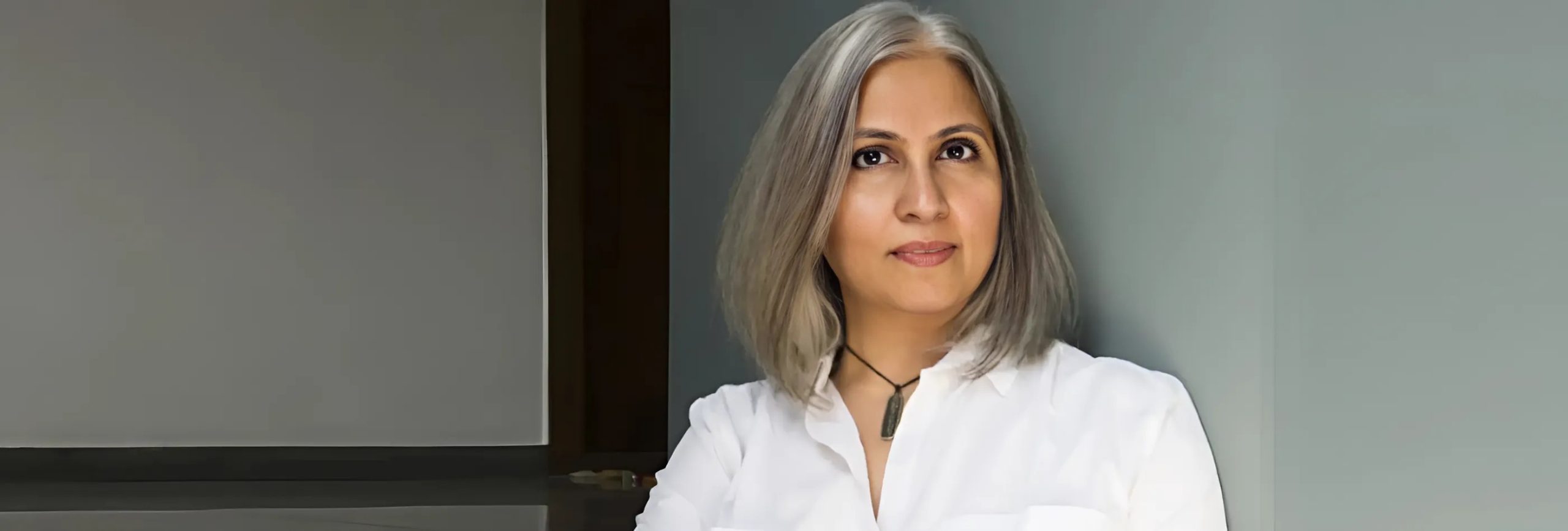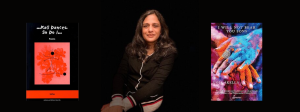(November 16, 2024) Amrita Shah’s latest book, The Other Mohan, dives into a family mystery that has fascinated her for years — the journey her great-grandfather, Mohanlal, made from pre-Independent India to South Africa. But this isn’t just a personal quest; her research unfolds the rich and complex history of the Indian diaspora in the Indian Ocean, revealing a world of migrations shaped by traders, indentured labourers, smugglers, and political exiles. For the award-winning author, this book adds another layer to a remarkable career.
“As a child, I was told that I had a great grandfather named Mohanlal, who was an interpreter. Around the turn of the 20th century, he went to South Africa for a few years. I did not know anything else about the event but it fascinated me,” she tells Global Indian.

She’s been a pioneering editor — taking charge of Debonair, India’s answer to Playboy, in the early ’90s, a role that raised eyebrows but didn’t stop her from shaking things up. “It is amazing that such a magazine could exist and flourish at the time,” smiles journalist, scholar and author Amrita Shah.
Shah went on to help launch Elle India, break major stories on Mumbai’s underworld, and write powerful biographies and social histories, from Vikram Sarabhai: A Life to Ahmedabad: A City in the World and Telly-Guillotined: How Television Changed India.
The Other Mohan
As her latest book, The Other Mohan hit the stands recently, she delves into her quest to understand why her great-grandfather, Mohanlal, set sail for South Africa from pre-Independent India.
Drawing on an extensive range of sources interwoven with her own first-hand research in India, South Africa, Mauritius and Britain, Amrita covers a wide gamut, including in its sweep, the Indian Ocean, the mediaeval port of Surat where Europeans set up their earliest trading companies in India, the evolution of colonial Bombay and Indian migrant communities in the Indian Ocean littoral.

Gandhi Link
By foregrounding the story of her great-grandfather and of the opportunistic drive that led thousands of Indians to seek their fortunes across an ocean, Amrita offers a supplementary history to explain many aspects of India’s present. “My book is formatted like a thriller unravelling the story of my pursuit bit by bit. An important discovery I made right at the start was that Mohanlal had met Gandhi in South Africa and had participated in his Satyagraha campaign in 1908,” says a beaming Amrita.
In 1908, Gandhi was fighting against a racist law which required Indians to register themselves in the Transvaal region of South Africa with their fingerprints and to show their passes to the police, as if they were criminals. Even educated Indians who were allowed to enter the Transvaal under the immigration law had to register themselves with their fingerprints.
Iconic moment
In August that year, a crowd of Indians gathered at the Hamidia Mosque in Johannesburg and burnt their identity papers. This event had become an iconic moment in the history of the struggle against oppression and was dramatised in Richard Attenborough’s Gandhi. “My great grandfather was present at this event. He had joined a group of educated Indians who entered the Transvaal and refused to register themselves as required. They were arrested and spent many weeks in jail,” says the author, who found this and lots of other information in the archives in South Africa.

The writing of this book brought Amrita face-to-face with a different history of the Indian diaspora in the western Indian ocean. “It is a history that has not yet been told. Hence the title, “The Other Mohan,” says Amrita, who showcases the adventuring and enterprising spirit of Indians and the way they inserted themselves into the capitalist system introduced by European colonists.
It took her a decade of research to write the engaging book. “While the book is about an ancestral pursuit and history, it is also a travelogue about a journey that takes place in the contemporary world.”
Many Indians arrived in South Africa in the late 19th and early 20th centuries under harsh conditions, bound by contracts that forced them into gruelling labour on sugarcane plantations and in coal mines. Alongside these labourers were “passenger Indians,” a smaller group of merchants and traders, primarily from Gujarat, who arrived independently to set up businesses. This community faced significant discrimination, segregated housing, limited rights, and high taxes specifically targeting Indians. It was in this challenging environment that Gandhi developed his philosophy of satyagraha or nonviolent resistance, inspired by the struggle for justice within the Indian diaspora.

The Mumbaikar
Born 1962, Amrita did her schooling from St Joseph’s Convent in Bandra, Mumbai and went to Elphinstone College, Mumbai from where she graduated in 1983. A school topper, who was good at academics, she loved reading. “Geography was my least favourite – which is ironic given that I have just written a book about an ocean and movement within it,” smiles Amrita, who enjoyed art and elocution in school. In college, she was the cultural secretary and also ran the Wallpaper and edited college magazines and did a little theatre.
Her father worked for the Life Insurance Corporation and had a parallel career as a historian of Hindi film music. “His approach to work–reading widely and following research leads assiduously, influenced me greatly,” says the writer. Her mother was a housewife who had studied classical Indian dance.
Debonair
Amrita Shah started her career at a famous features magazine, Imprint. Thereafter, she joined Debonair in January 1991 and continued till March 1992. “Debonair was modelled on Playboy. It was started in the 1970s when there was no commercial television and few forms of entertainment. Probably, the owner thought a magazine of this sort was a good idea,” recalls Amrita.

Going Global
Thereafter, she worked for Time-Life and was one of the few stringers in South Asia and probably the youngest at the time. “India was not considered to be of much interest to a western audience when I started out but as it began to open its economy, the western media took notice,” she says.
She contributed to a cover story on India’s Consumer Boomers which triggered off an avalanche of global interest in India as a market. Amrita Shah also co-wrote stories on important trends of the time such as popular culture and communal violence.
Off to New York
The renowned writer was hosted by the Institute for Public Knowledge at New York University (September 2009-July 2010) where she was provided with office space and access to the university’s facilities to do her independent, scholarly work. She was supported by a fellowship from the Fulbright Foundation. “It was an extremely enriching experience for someone like me who was used to struggling in India to suddenly have access to thousands of books at one time. If the NYU library did not have something I was looking for, they procured it via an interlibrary loan,” informs Amrita, recipient of the Raymond-Crossword Book award, 2016 and Tejeshwar Singh Memorial Award for Excellence in Writing on the Urban from Sage Shortlist, 2017.
She had been to New York before but this stint was also her introduction to academia and to the community of scholars working on the politics and history of South Asia.

At Johannesburg
Amrita Shah also went to the Johannesburg Institute for Advanced Study (JAIS) as a Writing Fellow for four months (February-May 2018). The Institute is affiliated to the University of Johannesburg but has an independent house where she was accommodated with other fellows, from all over the world. “I had finished most of my research on The Other Mohan by then but it was useful to look up references I had missed and be able to meet with experts to clarify doubts,” she says.
The fellowship also arranged a few trips for them. “We attended a theatre festival in a small border town and met inmates of a jail in a town up north. These are unforgettable experiences.”
Life in Mumbai
Amrita Shah says she has been leading a peripatetic life for some time and is back in Mumbai after a gap of 12 years. “I have been in Mumbai every year to visit my family but it is different to move back home,” she says.
She writes daily, either at her home in the suburbs or in cafes – she has a few favourites in Bandra. “I go downtown occasionally to the art galleries or the Asiatic Library, which is a wonderful resource. I meet friends or catch a play at Prithvi in Juhu or the new NMACC,” says the avid reader, who loves theatre, art and music.
Ask her if there are more books in the pipeline? “Yes. I studied Prime Minister Narendra Modi’s rise in Gujarat when he was the Chief Minister and the socio-political context that made it possible. I want to write a long essay based on my study and the international parallels I was able to draw to explain what is happening in contemporary India.”
As she settles back into Mumbai, reacquainting herself with its evolving landscape, Amrita remains as committed to storytelling as ever. With The Other Mohan, she has delivered a book that not only pays homage to her ancestor’s journey but also shines a light on the larger, untold histories that shape us today.
- Follow Amrita Shah on X
Read a similar story of Mitu Bhowmick Lange, bringing Indian cinema to Australia.





